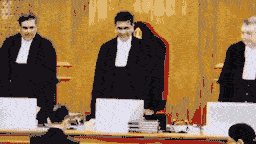
New Delhi: Chief Justice of India (CJI) DY Chandrachud issued his last judgment on Sunday before stepping down from the post, making a strong statement against the practice of “bulldozer justice.” The judgment, delivered by a bench headed by CJI Chandrachud and comprising Justices JB Pardiwala and Manoj Misra, sharply criticized state governments that engage in the demolition of personal property without due process, especially when those affected are allegedly involved in criminal activity.
What was the case?
The case in question revolved around the demolition of journalist Manoj Tibrewal Aakash’s ancestral home in 2019, which was carried out by local authorities without following proper legal procedures.
The demolition was preceded only by a public announcement through drumbeats, or munadi, with no formal written notice or justification provided to the occupants.
The Supreme Court ruled that the action was not only unlawful but also a violation of the basic tenets of natural justice.
In his final judgment, CJI Chandrachud declared, “Bulldozer justice is simply unacceptable under the rule of law. If it were to be permitted, the constitutional recognition of the right to property under Article 300A would be reduced to a dead letter.”
He emphasized that justice should never be administered through arbitrary demolitions and that such actions threatened the very foundations of a fair and impartial legal system.
The court directed the state authorities to pay interim compensation of ₹25 lakh to the affected petitioner, Manoj Tibrewal Aakash, and ordered a disciplinary inquiry into the officials responsible for the illegal demolition. “Justice through bulldozers is unknown to any civilized system of jurisprudence,” CJI Chandrachud wrote.
“There is a grave danger that if high-handed and unlawful behavior is permitted by any wing or officer of the state, demolition of citizens’ properties will take place as a selective reprisal for extraneous reasons.”
CJI Chandrachud remarked that “voices of the citizens cannot be suppressed or disrupted by demolishing their properties and homes,” further asserting that while the law does not condone unlawful occupation of public land, it must be exercised within the bounds of fairness and accountability.
In a broader reflection on public accountability, the bench stated, “Public officials must be held accountable for their actions, and those who carry out or sanction such unlawful demolition must face disciplinary action and criminal sanctions.”
CJI Chandrachud will step down on Sunday after serving as the head of the judiciary for nearly two years. Justice Sanjiv Khanna will take over as the new Chief Justice of India on Monday, November 11.





